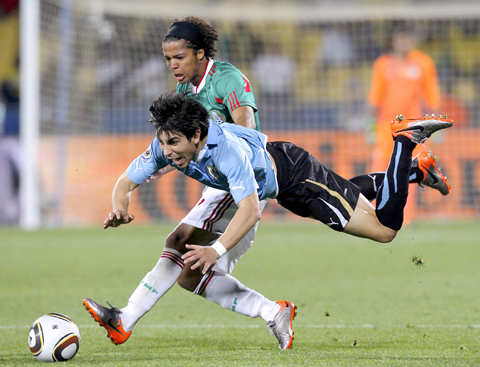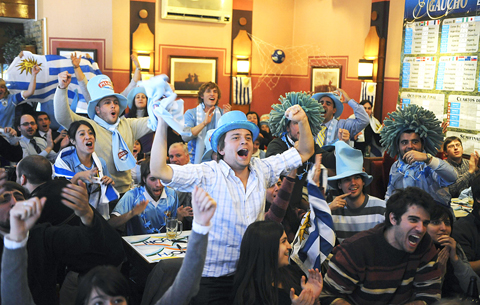GROUP A
▲Mexico 0 - 1 Uruguay
Uruguay sent their long-suffering fans into rapture on Tuesday when they secured a place in the second round of the World Cup finals for the first time in 20 years.

PHOTO: REUTERS
The sky-blue-shirted team beat Latin American rivals Mexico 1-0 thanks to a well-made and perfectly-taken 43rd minute headed goal by Luis Suarez.
For coach Oscar Tavarez, it was also a personal triumph as he was in charge of Uruguay, the champions of 1930 and 1950, when they last reached the final 16 in Italy in 1990.
Suarez’s strike for his first goal at these finals settled the outcome of a tightly contested game that ensured Uruguay qualified as the Group A winners ahead of the Central Americans.

PHOTO: AFP
This means they will avoid South American neighbors Argentina and face runners-up South Korea in Port Elizabeth on Saturday.
Despite losing, Mexico also went through by virtue of having a better goal difference than hosts South Africa. France finished bottom.
“We’re going to take it one game at a time ... now we’ve been lucky enough to achieve our first goal, which was to get through the group phase,” man-of-the-match Suarez said.
TOUGH SIDE
Coach Tabarez stayed calm amid the clamor.
“We showed we are a tough side to tackle now and, if you look at our history in the past few World Cups, you will know why I am extremely satisfied with this result,” he said.
“It was a tough game, but we were better in the first half. I have no idea how far we can go — the reality is on the pitch — and I get more satisfaction from the team display than any personal achievement,” he said.
His team, mixing South American steel with pace and panache, deserved to win after surviving spells of flamboyant Mexican possession play in the opening half to stamp their authority on the game.
When Mexico, invigorated by three substitutions early in the second period, raised their tempo, the Uruguayan defense worked stubbornly, and rode their luck, to hang on.
FOURTH WIN
It was Uruguay’s first win over the Mexicans in four games since beating them 2-0 in Chicago in 2003, and only their fourth overall in 18 meetings — little wonder that supporters of the team, known as “La Celeste,” were singing into the night sky long after Mexico had left the field.
Mexico embroidered a generally open and entertaining game with plenty of intricate passing and some excellent individual moments, but could have little complaint at the final result.
They will now face Argentina in Johannesburg on Sunday and will need to raise their game considerably to keep alive any hope of reaching the quarter-finals for a third time.
“We have to get better, whatever happens ... in terms of what lies ahead, everything is down to us and we have to continue with the good work and try to do what we did against France,” defender Rafael Marquez said.
On an unexpectedly warm evening under a falling sun at the Royal Bafokeng Stadium, the first half produced a mixture of sweeping moves and irritating stoppages.
Tension seemed to grip both sides as news from Bloemfontein — where South Africa were playing France — arrived, signaled by lengthy blasts from the many vuvuzuelas in a crowd dominated by Mexican green.
Mexico had the best early chance when Andres Guardado hit the bar from 30m, but for all their clever approach play, they rarely threatened a breakthrough.
Uruguay, solid at the back and expansive in attack, where Diego Forlan probed, Edinson Cavani broke swiftly on the flanks and Suarez smoldered with intent, were never dazzled or unnerved.
They had seen off the best Mexico had to offer when they took the lead after 43 minutes, Forlan collecting and finding the dangerous Cavani running on the right. His deep cross to the far post was met by Suarez, whose accurate far-post header bounced down and up beyond Oscar Perez.
There were more near misses at both ends before the vuvuzelas went silent and Uruguayan anthems filled the night.

Shohei Ohtani and Clayton Kershaw on Friday joined their Los Angeles Dodgers teammates in sticking their fists out to show off their glittering World Series rings at a ceremony. “There’s just a lot of excitement, probably more than I can ever recall with the Dodger fan base and our players,” manager Dave Roberts said before Los Angeles rallied to beat the Detroit Tigers 8-5 in 10 innings. “What a way to cap off the first two days of celebrations,” Roberts said afterward. “By far the best opening week I’ve ever experienced. I just couldn’t have scripted it any better.” A choir in the

After fleeing Sudan when civil war erupted, Al-Hilal captain Mohamed Abdelrahman and his teammates have defied the odds to reach the CAF Champions League quarter-finals. They are today to face title-holders Al-Ahly of Egypt in Cairo, with the return match in the Mauritanian capital, Nouakchott, on Tuesday next week. Al-Hilal and biggest domestic rivals Al-Merrikh relocated to Mauritania after a power struggle broke out in April 2023 between the Sudanese army and a paramilitary force. The civil war has claimed tens of thousands of lives and displaced more than 12 million people, according to the UN. The Democratic Republic of the Congo-born Al-Hilal

The famously raucous Hong Kong Sevens are to start today in a big test for a shiny new stadium at the heart of a major US$3.85 billion sports park in the territory. Officials are keeping their fingers crossed that the premier event in Hong Kong’s sporting and social calendar goes off without a hitch at the 50,000-seat Kai Tak Stadium. They hope to entice major European soccer teams to visit in the next few months, with reports in December last year saying that Liverpool were in talks about a pre-season tour. Coldplay are to perform there next month, all part of Hong Kong’s

Shohei Ohtani, Teoscar Hernandez and Tommy Edman on Thursday smashed home runs to give the reigning World Series champions the Los Angeles Dodgers a 5-4 victory over Detroit on the MLB’s opening day in the US. The Dodgers, who won two season-opening games in Tokyo last week, raised their championship banner on a day when 28 clubs launched the season in the US. Dodgers manager Dave Roberts shuffled his batting lineup with all four leadoff hitters finally healthy as Ohtani was followed by Mookie Betts, then Hernandez and Freddie Freeman in the cleanup spot, switching places with Hernandez. “There’s a Teoscar tax to